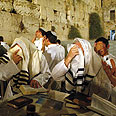
SAN FRANCISCO - When she was a teenager, Jennifer Traig believed she was a good Jew. But never good enough.
To fulfill the mitzvah of hand washing, before Shabbat dinner Traig would routinely scrub her hands in scalding water for 30 minutes.
She would stash her belongings in the family washing machine because she feared contamination by “bacon fumes.”
And she prayed and prayed, sometimes for hours a day. Far more than is required in traditional Judaism, or any religion for that matter.
Life for Traig was a holy hell. Now, as an adult, she knows the reason why.
For years, she was plagued with a form of obsessive-compulsive disorder known as scrupulosity. People with that disorder observe the rules of their religion (including some they make up) so stringently they practically observe themselves to death.
The San Francisco resident chronicles her long struggle and eventual triumph over scrupulosity in a newly published memoir “Devil in the Details” (224 pages, Little Brown, $22.95).
“Before (publisher) Little Brown bought the book,” recalls Traig, “they checked to make sure I wasn’t making this up.”
Of course she wasn’t. But she has a sense of humor about it all, as reflected in her book. In addition to the narrative drawn from diaries she kept as a teen, Traig includes such extras as “A Guide to Proper Hand Washing Technique,” “Beauty Tips for Fastidious Girls” and “Global Events for Which I Considered Myself Responsible” (among the latter: the Falklands War, apartheid and New Coke).
Who's to say where piety ends?
Today, Traig, 34, is a successful freelance writer. She also remains an observant Jew, which may seem counterintuitive given her history. But as Traig and the doctors who treat scrupulosity know, the condition has little to do with religion itself.
Yet in a world where some Shiites flagellate themselves to commemorate the grandson of Muhammad, when Filipino Christians have themselves nailed to a
wooden cross on Easter, who’s to say where one person’s piety ends and another’s scrupulosity begins?
Scott Granet, a San Mateo psychotherapist and president of the OCD Foundation in the Bay Area, says the answer has to do with psychic pain.
“I look for how much distress the person experiences,” he says, “how much impact is it having on their day-to-day lives. It’s an important distinction. We don’t want to interfere with a person’s religious beliefs.”
Psychiatrist Dan Weiner, who treats patients with scrupulosity at the San Francisco Bay Area Center for Cognitive Therapy, agrees.
“Is the person going above and beyond what is expected from the religion?” he asks. “Most religious Jews would feel a sense of completion having put on tefillin once in a morning. The scrupulous Jew might put on the tefillin, feel a mild sense of relief, then immediately start to feel inadequate. He might repeat the action a second or third time.”
Keeping problem a secret
Then there’s guilt, which can kick in easily and often. History is filled with examples of scrupulosity: John Bunyan, the British author of “Pilgrim’s Progress,” obsessed over his belief that he had committed some unpardonable sin against God, even though he could never name it.
Weiner explains the difference between obsession and compulsion: Obsession is a mental preoccupation while compulsion is an irresistible impulse to act on an obsession. Some patients, like Traig, manifest both. Others do not.
“I had a Jewish patient who would obsess about the word ‘tsuris,’” recalls Weiner. “He would think of the word repeatedly throughout the day, and mentally he would have to say some Hebrew phrase that would neutralize his thought of tsuris. The compulsion was covert.”
Keeping scrupulosity a secret makes the disorder that much harder to bear. “One reason I wanted to do this book,” says Traig, “is because I was convinced I was the only person who had it.”
Prozac a 'godsend'
Actually, OCD is a common condition, and today, there are many effective treatments, including group therapy, individual psychotherapy and good ol’ fashioned psychopharmacology.
“Prozac,” says Traig, “is a godsend.”
These days, Traig is productive and happy. She’s has written several crafts books and is working on a novel. Her scrupulosity days are in the past.
Mostly.
Her “Devil in the Details” reveals not only the strangeness of her OCD symptoms, but also their durability. Even now, years after her cure, Traig says, “I still find myself checking and rechecking the front door lock and whether I have my wallet.”
Article reprinted by permission of J, the Jewish news weekly of Northern California















